

Our sustainable
undertakings
undertakings
We love fashion, but we know that the textile industry is among those that pollute the most in the world.
Completely eco-friendly collections? We’re still working on that if we’re honest. Improve our products so that they are even more ethical and virtuous? Yes, more than ever! We’re only getting going, of course. We have to (re)learn, (re)design and do everything. But we promise that the eco-friendly efforts we’re making won’t be futile! The willingness to change is definitely there, the team is determined to take on all these challenges and see them through to the end, and openly share everything that we do. All committed, means the start of a story of modesty and pertinence, between I.Code, our partners, suppliers and you, of course.
step 01.
THE FOOTPRINT
As THE priority of our “all committed” approach is to reduce our carbon emissions, we carried out our first carbon footprint in 2019.
WHY CARRY OUT A CARBON FOOTPRINT?
A carbon footprint enables all of the greenhouse gas emissions (GHG) a company emits to be calculated. Having a precise idea of your carbon footprint enables the actions that should be taken as a priority to be highlighted to reduce the impact the company’s activities has on the environment.
OUR AIMS?
- Reduce how much energy we use
- Find more ethical alternatives for the environment by gradually replacing our dependence on fossil fuels
- Create awareness among our teams and have them take part in the sustainable turn the company is taking.
THE RESULTS OF OUR CARBON FOOTPRINT AND THE ACTIONS TO BE TAKEN BY 2025
21%*
Virgin polyester
Our aim: eliminate virgin polyester by replacing it with recycled polyester and more ethical materials
11%*
Conventional cotton:
Our aim: replace conventional cotton with certified and traceable organic cotton. OR recycled or cotton being converted
10%*
Conventional wool:
Our aim: replace conventional wool with certified or recycled wool
8%*
Freight transport
Our aim: reduce air transport as much as possible (15% by 2025) by giving preference to transport by land or sea.
*of our Greenhouse Gas footprint
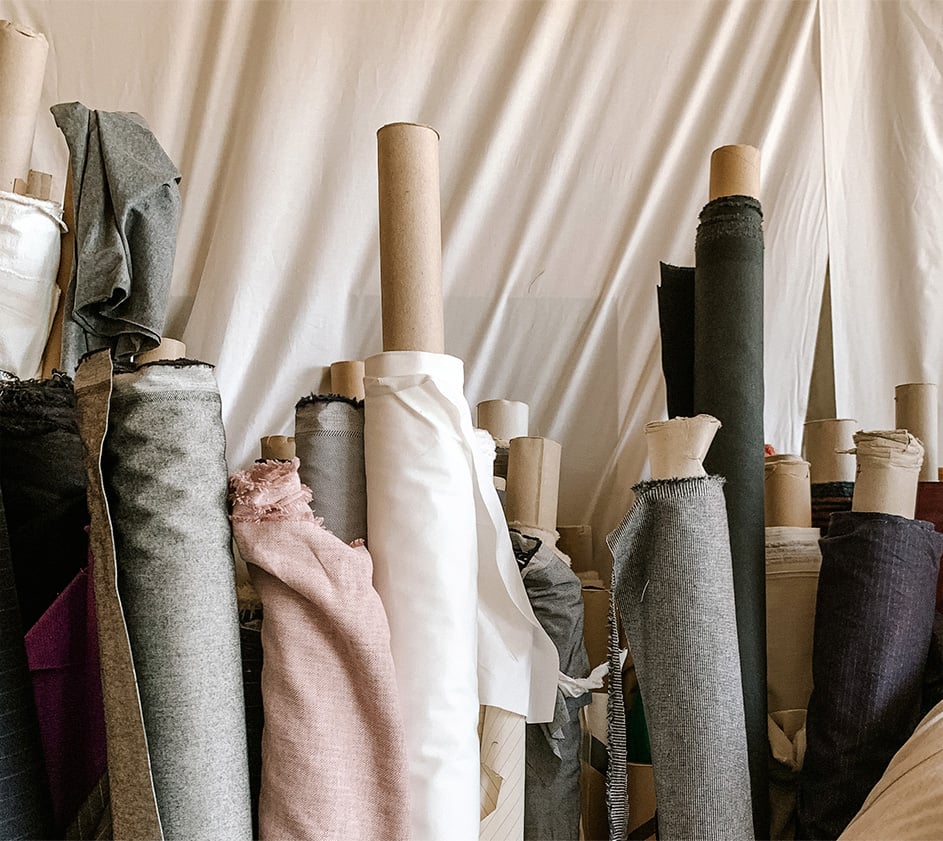
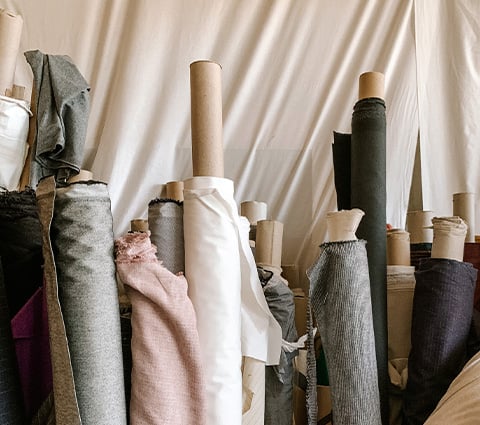
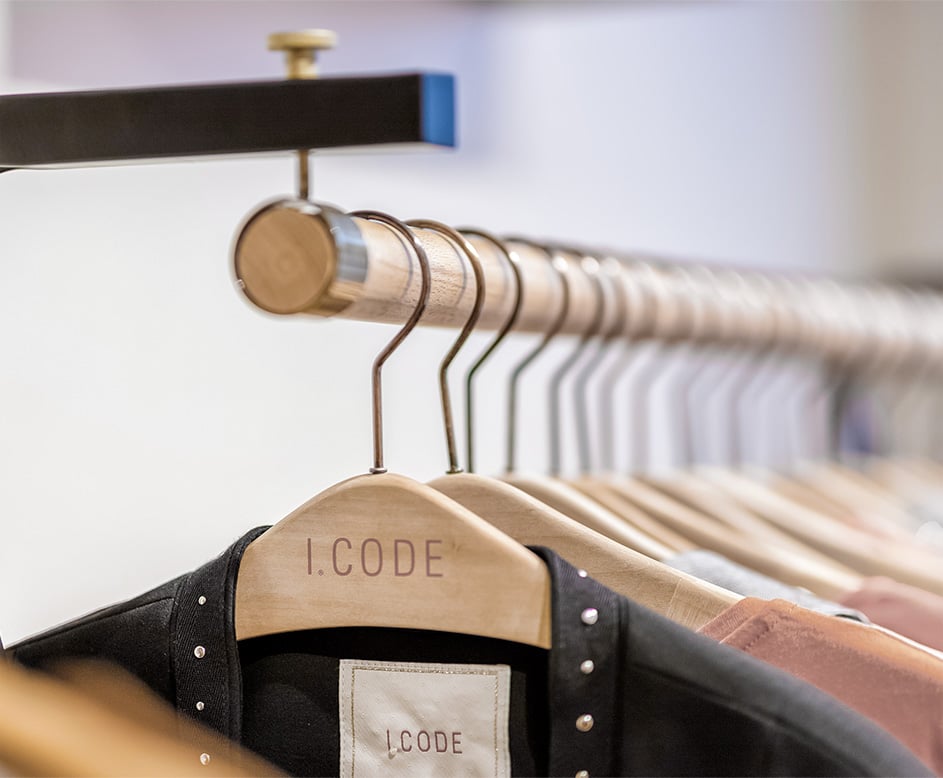
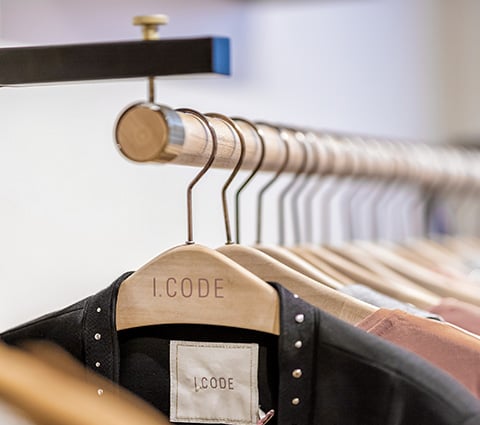
‘By 2025, our objective
is to reduce our carbon impact by 30% compared
to 2019.
‘
step 02.
COMMITMENT
As we are convinced that in order to transform the fashion industry
we need to combine forces and move in the same direction, I.Code signed the Fashion Pact in December 2021 as part of the IKKS Group.
What is the Fashion Pact?
The Fashion Pact is a series of measures that aim to reduce the environmental impact of the textile sector. It was presented on 23 August 2019 at the Élysée, then during the G7 to the Heads of State meeting in Biarritz on 26 August 2019. Via a set out calendar and ethical practices, signatory companies commit to three main environmental objectives: slowing down global warming, respecting biodiversity and protecting the oceans.
step 03.
TRANSPARENCY
TRACEABILITY
2022.
I.Code has used the Footbridge platform since 2022, which has become one of the bases of the ecodesign strategy for its collections. Thanks to this collaboration, I.Code meets the very strong demand of its customers in terms of transparency on the environmental footprint of its products (calculated ex factory, the figures calculated include raw material production and the energy used, manufacturing, packaging, transport, distribution, use and end of life) and at the places where they are manufactured (tracing the information about each stage in manufacturing a piece of clothing precisely). Scanning the QR code printed on the label gives all the information about each stage in designing a piece for I.Code, from where the fabric comes from to the finished product.
2023.
Since 1 January 2023, 92% of our references have a QR code, a level which is significantly above others in the fashion industry, which places I.Code as a trailblaze in terms of traceability. By the end of 2023, I.Code plans to trace all of its references, i.e. about 1200 models per season.
I.Code has used the Footbridge platform since 2022, which has become one of the bases of the ecodesign strategy for its collections. Thanks to this collaboration, I.Code meets the very strong demand of its customers in terms of transparency on the environmental footprint of its products (calculated ex factory, the figures calculated include raw material production and the energy used, manufacturing, packaging, transport, distribution, use and end of life) and at the places where they are manufactured (tracing the information about each stage in manufacturing a piece of clothing precisely). Scanning the QR code printed on the label gives all the information about each stage in designing a piece for I.Code, from where the fabric comes from to the finished product.
2023.
Since 1 January 2023, 92% of our references have a QR code, a level which is significantly above others in the fashion industry, which places I.Code as a trailblaze in terms of traceability. By the end of 2023, I.Code plans to trace all of its references, i.e. about 1200 models per season.
OUR PRODUCTION ZONES
53%
MEDITERRANEAN BASIN
53%
europe
53%
asia
53%
india
⟶Hover over the map to find out more⟵

China
CHINA has undeniable expertise, both technical and in fashion. Via our factories, which have been set up there for many years, we develop pieces that require increased knowledge in terms of specific textiles, like parkas and pleating, as well as part of our sweaters and coats.
India
INDIA has been a partner for a long time and undertakes designing all our leather products, from jackets to bags via belts. They are also particularly good at embroidery, with is both meticulous and refined. These are details that make a difference.
Ukraine
In UKRAINE we manage tolling production, which precisely concerns all our warp and weft pieces like, for example, suits, dresses, tops, jackets and trousers.
Greece
Did you know that Greece was known for making casual clothes and more precisely jersey knit? We make T-shirts there in particular, which are soft, hard-wearing and perfectly cut.
North africa
NORTH AFRICA concentrates experts in working with denim. It’s therefore completely natural that we entrust production of the IKKS jeans you love so much, plus part of our sweaters, to our partner factories, which are ever more virtuous.
Portugal
Want a pretty pair of boots? We head for PORTUGAL, where we have chosen to have them made working with those who make commitments and who work with us on optimising resources.
France
We’ve been Made In FRANCE for a few seasons already, by starting to work with several local companies, set up 20 km from our head office. We designed this winter’s beanies and headbands with Royal Mer, based at La Regrippière. We work on designing limited edition organic cotton T-shirts with A.D Confection on a regular basis. Wonderful partnerships that all make sense.
China
CHINA has undeniable expertise, both technical and in fashion. Via our factories, which have been set up there for many years, we develop pieces that require increased knowledge in terms of specific textiles, like parkas and pleating, as well as part of our sweaters and coats.
India
INDIA has been a partner for a long time and undertakes designing all our leather products, from jackets to bags via belts. They are also particularly good at embroidery, with is both meticulous and refined. These are details that make a difference.
Ukraine
In UKRAINE we manage tolling production, which precisely concerns all our warp and weft pieces like, for example, suits, dresses, tops, jackets and trousers.
Greece
Did you know that Greece was known for making casual clothes and more precisely jersey knit? We make T-shirts there in particular, which are soft, hard-wearing and perfectly cut.
North africa
NORTH AFRICA concentrates experts in working with denim. It’s therefore completely natural that we entrust production of the IKKS jeans you love so much, plus part of our sweaters, to our partner factories, which are ever more virtuous.
Portugal
Want a pretty pair of boots? We head for PORTUGAL, where we have chosen to have them made working with those who make commitments and who work with us on optimising resources.
France
We’ve been Made In FRANCE for a few seasons already, by starting to work with several local companies, set up 20 km from our head office. We designed this winter’s beanies and headbands with Royal Mer, based at La Regrippière. We work on designing limited edition organic cotton T-shirts with A.D Confection on a regular basis. Wonderful partnerships that all make sense.
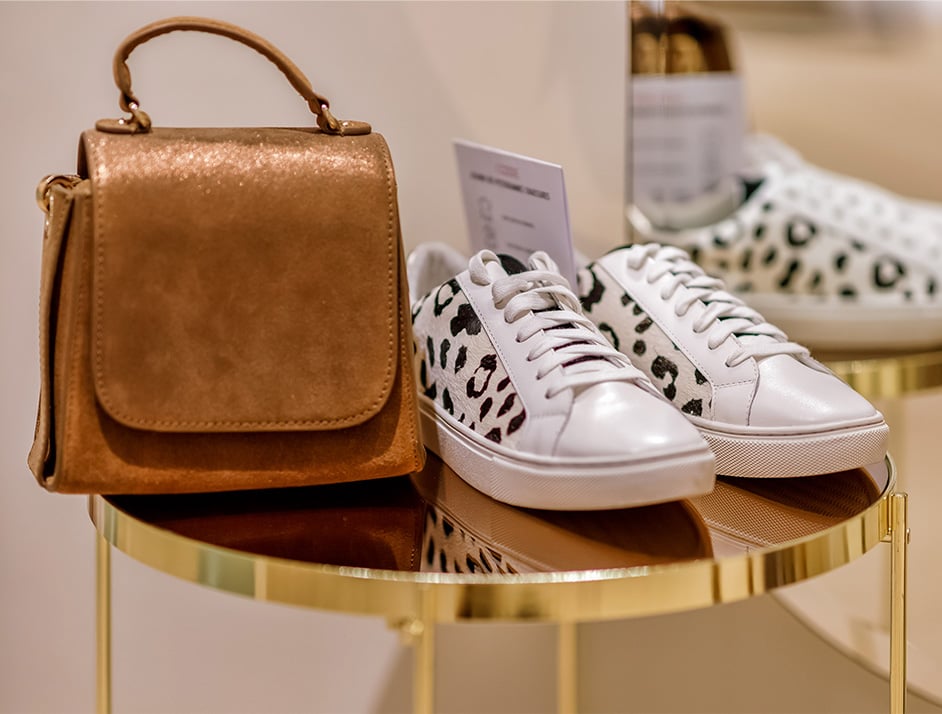
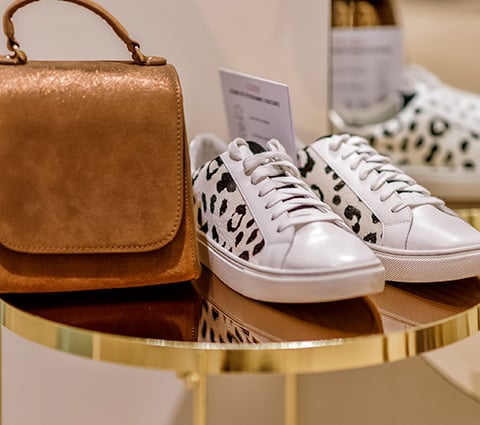


step 04.
THE SITUATION TO DATE
OUR CLOTHES
90%*
T-shirts
are made from organic cotton
75%*
SWEATSHIRTS & HOODIES
are made from organic cotton
50%*
TOPS, BLOUSES & SHIRTS
are made in eco-friendly fabrics
63%*
DRESSES
are made in eco-friendly fabrics
MATERIALS

LWG GOLD
1/3 of our belts and shoes are certified
100% of our leather jackets are certified
100% of our leather jackets are certified

Cotton
1/3 of the cotton we use is organic

Polyester
45% of the polyester we use is from recycled fabrics
Viscose
80% of the viscose we use is from sustainably-managed forests
step 05.
By 2025
A DESIRE TO GO FURTHER
Traceability
- 100% of our clothes manufacturer suppliers will be ICS audited –Score A or B
- Undertaking social audits for our knitters/weavers
- 100% of our cotton channels are traced end to end to identify our cooperatives.
- 100% of our leather channels are traced
- 100% of all of our channels are traced at least to knitter/weaver to guarantee regulations are respected (AGEC law)
Our materials
- 100% of leather products are certified LWG Gold (or equivalent)
- 100% of our cotton is farmed organically – undergoing conversion or recycled
- 100% of our polyester is recycled
- 100% of our viscose is from sustainably-managed forests
- 100% of our denim is made using organic or recycled materials
- 100% of our wool is recycled or from certified channels
- 100% of our feather/down filling is certified or in recycled polyester
Our practices
- End of plastic in our polybags
- Reducing our carbon footprint by 30% vs 2019


Une remise en question permanente,
avec l’envie de toujours faire de notre mieux pour la planète.
Ensemble, nous construisons les collections I.Code de demain
avec l’envie de toujours faire de notre mieux pour la planète.
Ensemble, nous construisons les collections I.Code de demain